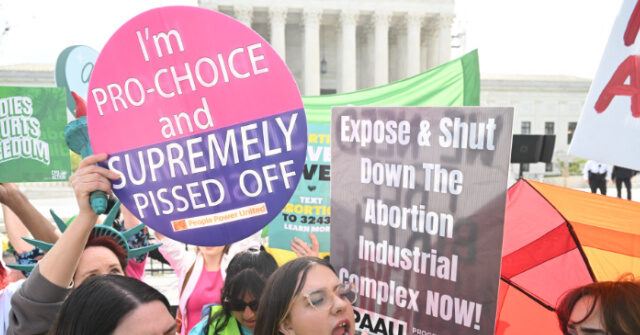We support our Publishers and Content Creators. You can view this story on their website by CLICKING HERE.

Ten states officially have abortion on the ballot in November — but in Nebraska, voters will have the opportunity to vote on warring proposed abortion amendments.
One measure would essentially allow abortions throughout pregnancy, while another would codify the state’s current 12-week abortion restriction.
The Protect Women and Children amendment, also called Initiative 434, would enshrine the state’s current 12-week restriction into the state constitution and contains exceptions for rape, incest, and life of the mother. Republican Nebraska Gov. Jim Pillen signed a bill in May 2023 that restricts abortion at 12 weeks of pregnancy and outlaws “gender-affirming care” for minors. Before the 12-week limit was in effect, Nebraska limited abortions to 20 weeks of pregnancy.
The ballot measure reads:
Except when a woman seeks an abortion necessitated by a medical emergency or when the pregnancy results from sexual assault or incest, unborn children shall be protected from abortion in the second and third trimesters.
The Protect Women and Children Nebraska Committee is comprised of four medical professionals and is backed by pro-life groups in the state as an alternative to the other ballot measure, which would allow abortions throughout pregnancy.
Nebraska Family Alliance, which also supports the measure, said it “establishes a floor of protection, not a ceiling, meaning preborn children must, at a minimum, be protected by the second trimester, and stronger pro-life laws could still be passed going forward.”
The other proposed amendment — the Protect the Right to Abortion amendment — would allow abortions until fetal viability, which is around 24 weeks of pregnancy, and then throughout pregnancy under some exceptions. The coalition behind the measure is called the Protect Our Rights campaign, and is endorsed by groups like the American Civil Liberties Union (ACLU) of Nebraska and Planned Parenthood Advocates of Nebraska.
The measure would amend the state constitution to read:
All persons shall have a fundamental right to abortion until fetal viability, or when needed to protect the life or health of the pregnant patient, without interference from the state or its political subdivisions. Fetal viability means the point in pregnancy when, in the professional judgment of the patient’s treating health care practitioner, there is a significant likelihood of the fetus’ sustained survival outside the uterus without the application of extraordinary medical measures.
The measures are competing, meaning if voters somehow approve both amendments, they cannot both be enshrined into the state constitution. The one that garners the most “for” votes is the one that is supposed to be adopted.
Either measure will need a majority to pass, as well as the support of 35 percent of voters casting ballots.
Every single pro-abortion-related ballot measure since the fall of Roe has been successful. During the 2022 special elections, Kansans rejected a ballot measure that would have established that the state Constitution does not include a right to abortion. During the 2022 midterms, voters in California, Michigan, and Vermont codified abortion into their Constitutions. At the same time, voters in Montana rejected a ballot measure that would have given rights to babies born alive in botched abortions. Voters in Kentucky also rejected an amendment similar to the one in Kansas. Last November, Ohioans also voted to codify the supposed right to abortion in their state Constitution via Issue 1.
Katherine Hamilton is a political reporter for Breitbart News. You can follow her on X @thekat_hamilton.

 Conservative
Conservative  Search
Search Trending
Trending Current News
Current News 







